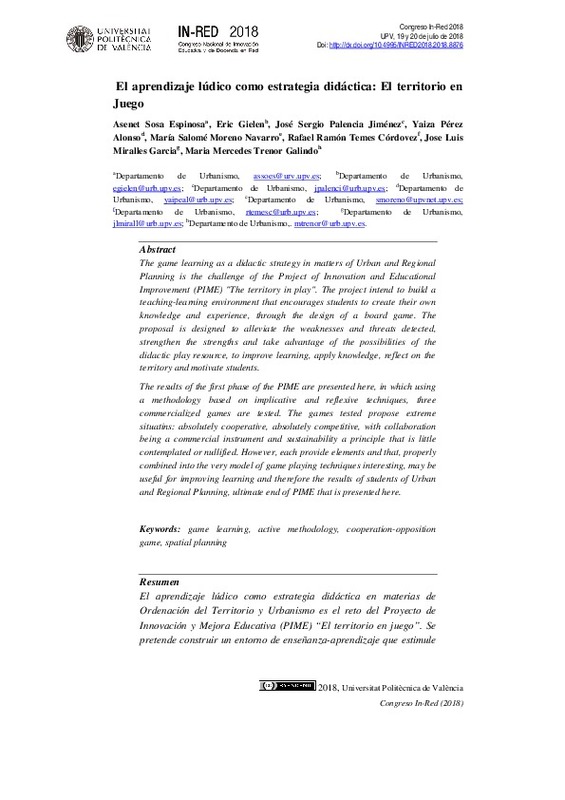JavaScript is disabled for your browser. Some features of this site may not work without it.
Buscar en RiuNet
Listar
Mi cuenta
Estadísticas
Ayuda RiuNet
Admin. UPV
El aprendizaje lúdico como estrategia didáctica: El territorio en Juego
Mostrar el registro completo del ítem
Sosa Espinosa, A.; Gielen, E.; Palencia Jiménez, JS.; Pérez Alonso, Y.; Moreno Navarro, M.; Temes Córdovez, RR.; Miralles García, J.... (2018). El aprendizaje lúdico como estrategia didáctica: El territorio en Juego. En IN-RED 2018. IV Congreso Nacional de Innovación Educativa y Docencia en Red. Editorial Universitat Politècnica de València. 1493-1503. https://doi.org/10.4995/INRED2018.2018.8876
Por favor, use este identificador para citar o enlazar este ítem: http://hdl.handle.net/10251/113212
Ficheros en el ítem
Metadatos del ítem
| Título: | El aprendizaje lúdico como estrategia didáctica: El territorio en Juego | |
| Autor: | Moreno Navarro, Maria Miralles García, José Trénor Galindo, Maria Mercedes | |
| Entidad UPV: |
|
|
| Fecha difusión: |
|
|
| Resumen: |
[EN] The game learning as a didactic strategy in matters of Urban and Regional Planning is the challenge of the Project of Innovation and Educational Improvement (PIME) "The territory in play". The project intend to build ...[+]
[ES] El aprendizaje lúdico como estrategia didáctica en materias de Ordenación del Territorio y Urbanismo es el reto del Proyecto de Innovación y Mejora Educativa (PIME) “El territorio en juego”. Se pretende construir un ...[+]
|
|
| Palabras clave: |
|
|
| Derechos de uso: | Reconocimiento - No comercial - Sin obra derivada (by-nc-nd) | |
| ISBN: |
|
|
| Fuente: |
|
|
| DOI: |
|
|
| Editorial: |
|
|
| Versión del editor: | http://ocs.editorial.upv.es/index.php/INRED/INRED2018/paper/view/8876 | |
| Título del congreso: |
|
|
| Lugar del congreso: |
|
|
| Fecha congreso: |
|
|
| Tipo: |
|









